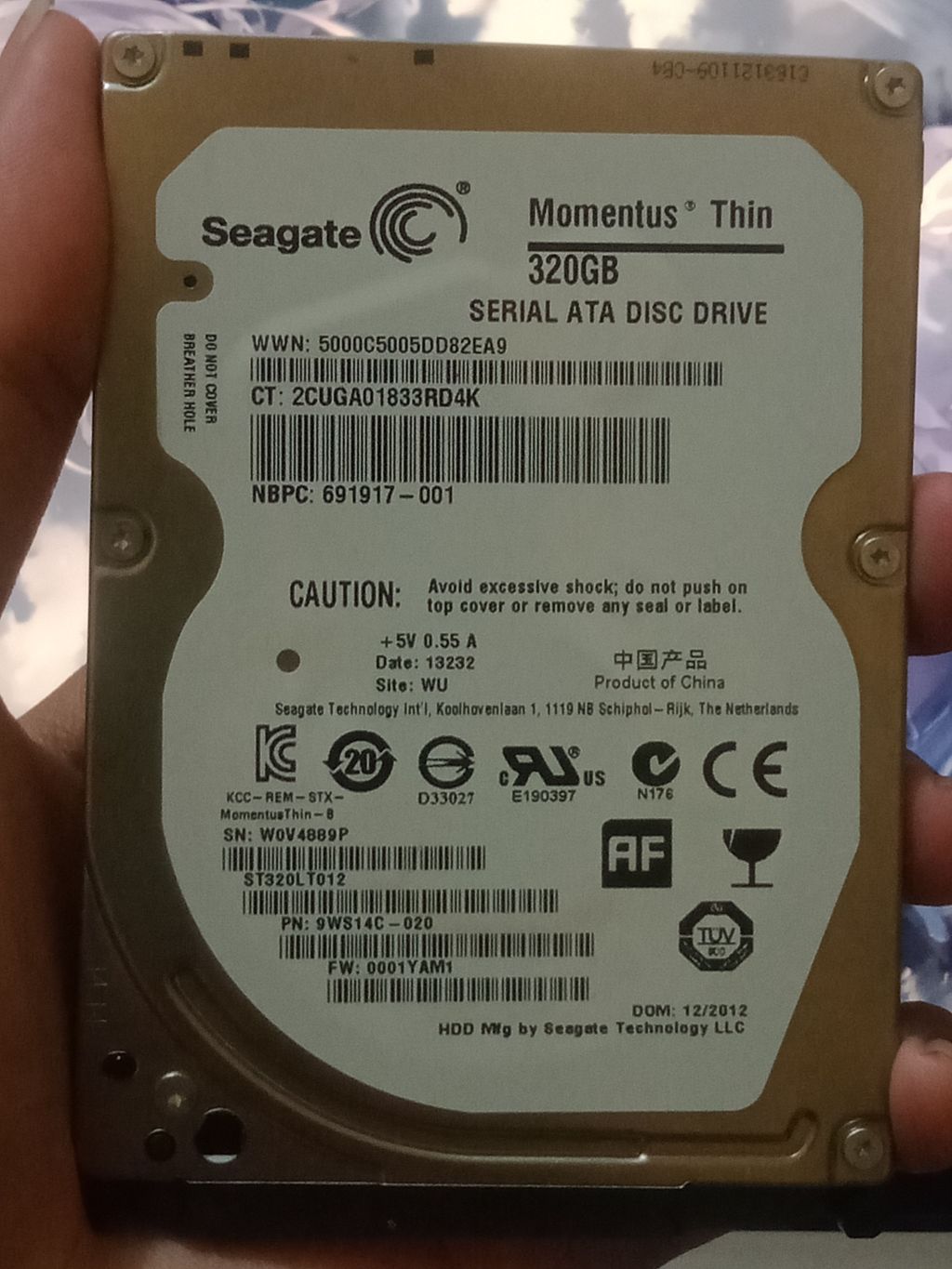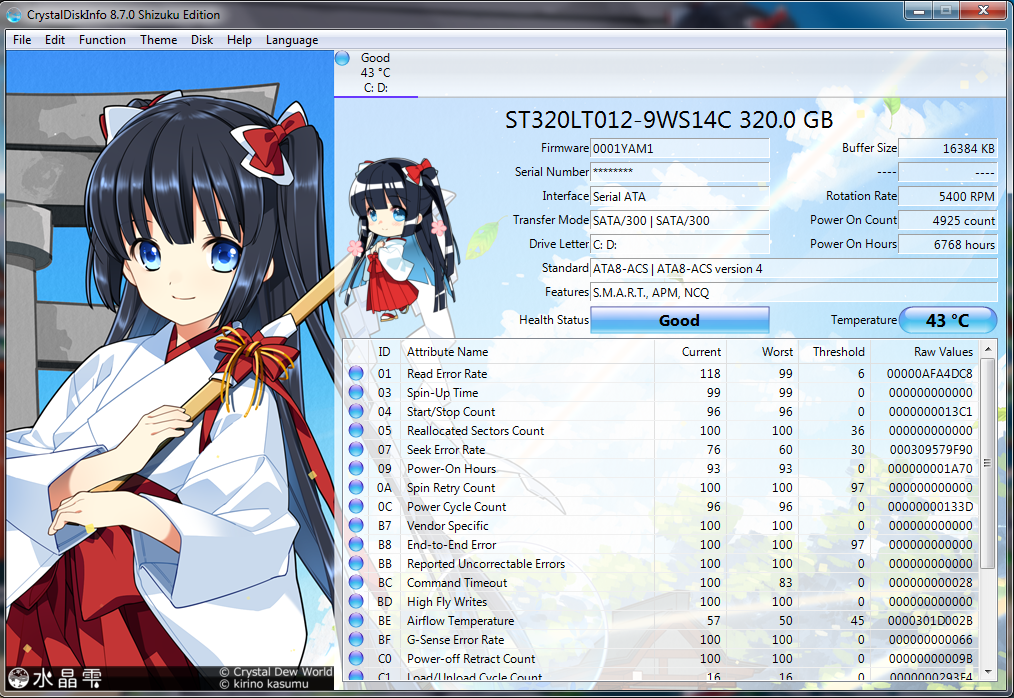Comparing: Seagate Momentus Thin ST320LT012-9WS14C vs SK hynix H9TQ27ADFTMC
In this comparison, we analyze two Disks: Seagate Momentus Thin ST320LT012-9WS14C and SK hynix H9TQ27ADFTMC, using synthetic benchmark tests to evaluate their overall performance. This side-by-side comparison helps users understand which hardware delivers better value, speed, and efficiency based on standardized testing. Whether you're building a new system or upgrading an existing one, this benchmark-driven evaluation offers valuable insights to guide your decision.

Seagate Momentus Thin ST320LT012-9WS14C
| Type: | Disks |
|---|---|
| Model: | Seagate ST320LT012-9WS14C |
| Capacity: | 320 GB |
| Interface: | SATA-II 3Gbps |

SK hynix H9TQ27ADFTMC
| Type: | Disks |
|---|---|
| Model: | SK hynix H9TQ27ADFTMC |
| Capacity: | 32GB |
| Interface: | eMMC |
Specification Comparison Table
This specification comparison presents technical details of several devices or components to help you understand the key differences between each option. Use this table as a reference to determine which device best suits your needs.
| Specification | Seagate Momentus Thin ST320LT012-9WS14C | SK hynix H9TQ27ADFTMC |
|---|---|---|
| Brand | Seagate | SK hynix |
| Format | HDD 2.5 | eMMC 5.1 |
| Capacity | 320 GB | 32GB |
| Interface | SATA-II 3Gbps | eMMC |
Submission Comparison Table
This submission comparison table displays the number and details of benchmark data submissions from various devices or components. This information helps you understand the performance based on the benchmarks that have been tested, as well as providing an overview of the consistency and popularity of the available benchmark results.
Submission Comparison Chart
This chart visualizes the benchmark scores comparison between two hardware devices based on submitted data.
Media Gallery
A collection of photos of tested hardware. These images can help you identify the physical form, model, and variant of the hardware in question. These photos are from our own documentation, and if they are not available we may not be able to document them.
About Hardware Seagate Momentus Thin ST320LT012-9WS14C
Seagate ST320LT012-9WS14C is a 320GB capacity hard disk drive (HDD) with a slim 2.5-inch form factor, ideal for laptops, notebooks and other portable systems. Designed using a SATA II (3Gbps) interface and a rotation speed of 5400 RPM, this HDD emphasizes power efficiency and quieter operation compared to higher-speed HDDs.
It uses 1 platter and 2 read/write heads, a common configuration for 320GB capacity, with light weight and low power consumption-suitable for mobile devices. Equipped with 16MB of buffer cache, its performance is sufficient for daily tasks such as saving documents, running light applications, or storing multimedia files.
This Seagate ST320LT012-9WS14C performance test was conducted using an HP 1000 1b05AU laptop that still relies on 4GB DDR3 Single Channel RAM with two DIMM slots. The operating system used during the test was Windows 7 64-bit, which is a typical environment for entry-level laptops in this era of HDD usage. The hardware combination reflects the real usage scenarios of older generation laptop users who still rely on mechanical hard disks as the primary storage medium.
In tests using CrystalDiskMark benchmark software, the Seagate ST320LT012-9WS14C hard disk recorded a fairly stable performance for the 5400 RPM HDD class. The sequential read speed reached 84.67 MB/s, while the sequential write speed stood at 83.84 MB/s. These results show that despite being an older generation HDD with modest specifications, its performance is still adequate for everyday light computing needs such as document storage and media playback.
Although its performance falls short of modern SSDs, the Seagate ST320LT012-9WS14C remains a reliable and cost-effective choice for users who need additional internal storage on older laptops, educational systems, or as external media (with a USB case). Its compact size and low power consumption also make it suitable for use in netbooks and other energy-efficient devices.
Device Test:
Device: HP 1000 1b05au
RAM: 4GB DDR3 Single Channel 2 DIMM
OS: Windows 7
Wednesday, 26 December 2012 14:27:32 | Update: 3 weeks ago
About Hardware SK hynix H9TQ27ADFTMC
SK hynix H9TQ27ADFTMC is an eMMC (embedded MultiMediaCard) based storage chip designed for mobile devices and embedded systems. With NAND Flash technology, it offers an efficient and power-efficient internal storage solution for devices with light to medium computing needs. It has become a common choice in entry-level smartphones, tablets, and Internet of Things (IoT) devices, thanks to its combination of sufficient capacity, high endurance, and long-term stable performance.
As an internal chip, the H9TQ27ADFTMC comes in a small yet reliable package, combining the controller and flash memory in a single unit for easy integration in consumer devices. One of the main advantages of eMMC storage like this is low power consumption and better data access latency compared to traditional SD card-based storage.
The test was conducted on an OPPO A5s device, a smartphone with a MediaTek Helio P35 (MT6765) processor, 3GB of RAM, and 32GB of internal storage. The operating system used was Android 8 with the ColorOS 5.2 interface. The test was conducted after the device had been in use for more than four years, so performance results may have decreased due to NAND Flash degradation over time.
In testing using the Cross Platform Disk Test (Mobile), the read speed of 114.31 MB/s and write speed of 13.07 MB/s were obtained. These results show that despite its age, the eMMC's read performance is still quite good for activities such as opening applications, loading the system, and streaming light content.
As a first-in-class internal storage solution, the SK hynix H9TQ27ADFTMC is suitable for devices that require fixed (non-removable) internal storage capacity with high efficiency, low cost, and sufficient endurance for daily use. Although its write speed is not as fast as more modern UFS technology, eMMC remains a popular choice due to its stability and ease of integration in many low- to mid-end devices.
Device: OPPO A5s
CPU: MediaTek MT6765 Helio P35
RAM: 3GB
Storage: 32GB
OS: Android 8, ColorOS 5.2
* The test was conducted after the device was approximately 4 years old, perhaps the performance has decreased
Sunday, 08 September 2019 11:02:46 | Update: 2 weeks ago


